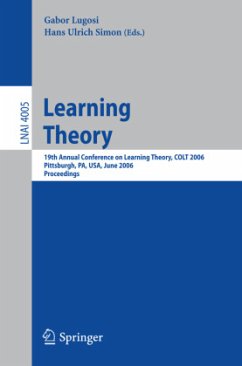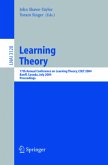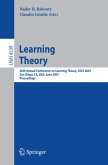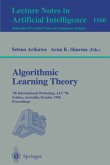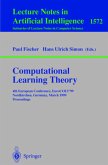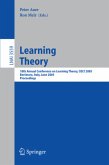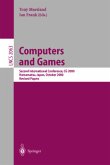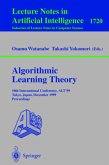Hans Ulrich Simon / Gábor Lugosi (eds.)19th Annual Conference on Learning Theory, COLT 2006, Pittsburgh, PA, USA, June 22-25, 2006, Proceedings
Learning Theory
19th Annual Conference on Learning Theory, COLT 2006, Pittsburgh, PA, USA, June 22-25, 2006, Proceedings
Herausgegeben:Simon, Hans Ulrich; Lugosi, Gábor
Hans Ulrich Simon / Gábor Lugosi (eds.)19th Annual Conference on Learning Theory, COLT 2006, Pittsburgh, PA, USA, June 22-25, 2006, Proceedings
Learning Theory
19th Annual Conference on Learning Theory, COLT 2006, Pittsburgh, PA, USA, June 22-25, 2006, Proceedings
Herausgegeben:Simon, Hans Ulrich; Lugosi, Gábor
- Broschiertes Buch
- Merkliste
- Auf die Merkliste
- Bewerten Bewerten
- Teilen
- Produkt teilen
- Produkterinnerung
- Produkterinnerung
This book constitutes the refereed proceedings of the 19th Annual Conference on Learning Theory, COLT 2006, held in Pittsburgh, Pennsylvania, USA, June 2006. The book presents 43 revised full papers together with 2 articles on open problems and 3 invited lectures. The papers cover a wide range of topics including clustering, un- and semi-supervised learning, statistical learning theory, regularized learning and kernel methods, query learning and teaching, inductive inference, and more.
Andere Kunden interessierten sich auch für
![Learning Theory Learning Theory]() John Shawe-Taylor / Yoram Singer (eds.)Learning Theory77,99 €
John Shawe-Taylor / Yoram Singer (eds.)Learning Theory77,99 €![Learning Theory Learning Theory]() Nader Bshouty (Volume ed.) / Claudio GentileLearning Theory75,99 €
Nader Bshouty (Volume ed.) / Claudio GentileLearning Theory75,99 €![Algorithmic Learning Theory Algorithmic Learning Theory]() Setsuo Arikawa / Arun K. Sharma (eds.)Algorithmic Learning Theory39,99 €
Setsuo Arikawa / Arun K. Sharma (eds.)Algorithmic Learning Theory39,99 €![Computational Learning Theory Computational Learning Theory]() Paul Fischer / Hans Simon (eds.)Computational Learning Theory39,99 €
Paul Fischer / Hans Simon (eds.)Computational Learning Theory39,99 €![Learning Theory Learning Theory]() Peter Auer / Ron Meir (eds.)Learning Theory77,99 €
Peter Auer / Ron Meir (eds.)Learning Theory77,99 €![Computers and Games Computers and Games]() Tony Marsland / Ian Frank (eds.)Computers and Games39,99 €
Tony Marsland / Ian Frank (eds.)Computers and Games39,99 €![Algorithmic Learning Theory Algorithmic Learning Theory]() Osamu Watanabe / Takashi Yokomori (eds.)Algorithmic Learning Theory39,99 €
Osamu Watanabe / Takashi Yokomori (eds.)Algorithmic Learning Theory39,99 €-
-
-
This book constitutes the refereed proceedings of the 19th Annual Conference on Learning Theory, COLT 2006, held in Pittsburgh, Pennsylvania, USA, June 2006. The book presents 43 revised full papers together with 2 articles on open problems and 3 invited lectures. The papers cover a wide range of topics including clustering, un- and semi-supervised learning, statistical learning theory, regularized learning and kernel methods, query learning and teaching, inductive inference, and more.
Hinweis: Dieser Artikel kann nur an eine deutsche Lieferadresse ausgeliefert werden.
Hinweis: Dieser Artikel kann nur an eine deutsche Lieferadresse ausgeliefert werden.
Produktdetails
- Produktdetails
- Lecture Notes in Computer Science 4005
- Verlag: Springer / Springer Berlin Heidelberg / Springer, Berlin
- Artikelnr. des Verlages: 11776420, 978-3-540-35294-5
- 2006
- Seitenzahl: 676
- Erscheinungstermin: 12. Juni 2006
- Englisch
- Abmessung: 235mm x 155mm x 37mm
- Gewicht: 934g
- ISBN-13: 9783540352945
- ISBN-10: 3540352945
- Artikelnr.: 20946272
- Herstellerkennzeichnung
- Springer-Verlag GmbH
- Tiergartenstr. 17
- 69121 Heidelberg
- ProductSafety@springernature.com
- Lecture Notes in Computer Science 4005
- Verlag: Springer / Springer Berlin Heidelberg / Springer, Berlin
- Artikelnr. des Verlages: 11776420, 978-3-540-35294-5
- 2006
- Seitenzahl: 676
- Erscheinungstermin: 12. Juni 2006
- Englisch
- Abmessung: 235mm x 155mm x 37mm
- Gewicht: 934g
- ISBN-13: 9783540352945
- ISBN-10: 3540352945
- Artikelnr.: 20946272
- Herstellerkennzeichnung
- Springer-Verlag GmbH
- Tiergartenstr. 17
- 69121 Heidelberg
- ProductSafety@springernature.com
Hans Ulrich Simon, Ruhr Universtät Bochum, Germany / Gábor Lugosi, Pompeu Fabra University, Barcelona, Spain
Invited Presentations.- Random Multivariate Search Trees.- On Learning and Logic.- Predictions as Statements and Decisions.- Clustering, Un-, and Semisupervised Learning.- A Sober Look at Clustering Stability.- PAC Learning Axis-Aligned Mixtures of Gaussians with No Separation Assumption.- Stable Transductive Learning.- Uniform Convergence of Adaptive Graph-Based Regularization.- Statistical Learning Theory.- The Rademacher Complexity of Linear Transformation Classes.- Function Classes That Approximate the Bayes Risk.- Functional Classification with Margin Conditions.- Significance and Recovery of Block Structures in Binary Matrices with Noise.- Regularized Learning and Kernel Methods.- Maximum Entropy Distribution Estimation with Generalized Regularization.- Unifying Divergence Minimization and Statistical Inference Via Convex Duality.- Mercer's Theorem, Feature Maps, and Smoothing.- Learning Bounds for Support Vector Machines with Learned Kernels.- Query Learning and Teaching.- On Optimal Learning Algorithms for Multiplicity Automata.- Exact Learning Composed Classes with a Small Number of Mistakes.- DNF Are Teachable in the Average Case.- Teaching Randomized Learners.- Inductive Inference.- Memory-Limited U-Shaped Learning.- On Learning Languages from Positive Data and a Limited Number of Short Counterexamples.- Learning Rational Stochastic Languages.- Parent Assignment Is Hard for the MDL, AIC, and NML Costs.- Learning Algorithms and Limitations on Learning.- Uniform-Distribution Learnability of Noisy Linear Threshold Functions with Restricted Focus of Attention.- Discriminative Learning Can Succeed Where Generative Learning Fails.- Improved Lower Bounds for Learning Intersections of Halfspaces.- Efficient Learning Algorithms Yield Circuit Lower Bounds.- OnlineAggregation.- Optimal Oracle Inequality for Aggregation of Classifiers Under Low Noise Condition.- Aggregation and Sparsity Via ?1 Penalized Least Squares.- A Randomized Online Learning Algorithm for Better Variance Control.- Online Prediction and Reinforcement Learning I.- Online Learning with Variable Stage Duration.- Online Learning Meets Optimization in the Dual.- Online Tracking of Linear Subspaces.- Online Multitask Learning.- Online Prediction and Reinforcement Learning II.- The Shortest Path Problem Under Partial Monitoring.- Tracking the Best Hyperplane with a Simple Budget Perceptron.- Logarithmic Regret Algorithms for Online Convex Optimization.- Online Variance Minimization.- Online Prediction and Reinforcement Learning III.- Online Learning with Constraints.- Continuous Experts and the Binning Algorithm.- Competing with Wild Prediction Rules.- Learning Near-Optimal Policies with Bellman-Residual Minimization Based Fitted Policy Iteration and a Single Sample Path.- Other Approaches.- Ranking with a P-Norm Push.- Subset Ranking Using Regression.- Active Sampling for Multiple Output Identification.- Improving Random Projections Using Marginal Information.- Open Problems.- Efficient Algorithms for General Active Learning.- Can Entropic Regularization Be Replaced by Squared Euclidean Distance Plus Additional Linear Constraints.
Invited Presentations.- Random Multivariate Search Trees.- On Learning and Logic.- Predictions as Statements and Decisions.- Clustering, Un-, and Semisupervised Learning.- A Sober Look at Clustering Stability.- PAC Learning Axis-Aligned Mixtures of Gaussians with No Separation Assumption.- Stable Transductive Learning.- Uniform Convergence of Adaptive Graph-Based Regularization.- Statistical Learning Theory.- The Rademacher Complexity of Linear Transformation Classes.- Function Classes That Approximate the Bayes Risk.- Functional Classification with Margin Conditions.- Significance and Recovery of Block Structures in Binary Matrices with Noise.- Regularized Learning and Kernel Methods.- Maximum Entropy Distribution Estimation with Generalized Regularization.- Unifying Divergence Minimization and Statistical Inference Via Convex Duality.- Mercer's Theorem, Feature Maps, and Smoothing.- Learning Bounds for Support Vector Machines with Learned Kernels.- Query Learning and Teaching.- On Optimal Learning Algorithms for Multiplicity Automata.- Exact Learning Composed Classes with a Small Number of Mistakes.- DNF Are Teachable in the Average Case.- Teaching Randomized Learners.- Inductive Inference.- Memory-Limited U-Shaped Learning.- On Learning Languages from Positive Data and a Limited Number of Short Counterexamples.- Learning Rational Stochastic Languages.- Parent Assignment Is Hard for the MDL, AIC, and NML Costs.- Learning Algorithms and Limitations on Learning.- Uniform-Distribution Learnability of Noisy Linear Threshold Functions with Restricted Focus of Attention.- Discriminative Learning Can Succeed Where Generative Learning Fails.- Improved Lower Bounds for Learning Intersections of Halfspaces.- Efficient Learning Algorithms Yield Circuit Lower Bounds.- OnlineAggregation.- Optimal Oracle Inequality for Aggregation of Classifiers Under Low Noise Condition.- Aggregation and Sparsity Via ?1 Penalized Least Squares.- A Randomized Online Learning Algorithm for Better Variance Control.- Online Prediction and Reinforcement Learning I.- Online Learning with Variable Stage Duration.- Online Learning Meets Optimization in the Dual.- Online Tracking of Linear Subspaces.- Online Multitask Learning.- Online Prediction and Reinforcement Learning II.- The Shortest Path Problem Under Partial Monitoring.- Tracking the Best Hyperplane with a Simple Budget Perceptron.- Logarithmic Regret Algorithms for Online Convex Optimization.- Online Variance Minimization.- Online Prediction and Reinforcement Learning III.- Online Learning with Constraints.- Continuous Experts and the Binning Algorithm.- Competing with Wild Prediction Rules.- Learning Near-Optimal Policies with Bellman-Residual Minimization Based Fitted Policy Iteration and a Single Sample Path.- Other Approaches.- Ranking with a P-Norm Push.- Subset Ranking Using Regression.- Active Sampling for Multiple Output Identification.- Improving Random Projections Using Marginal Information.- Open Problems.- Efficient Algorithms for General Active Learning.- Can Entropic Regularization Be Replaced by Squared Euclidean Distance Plus Additional Linear Constraints.

